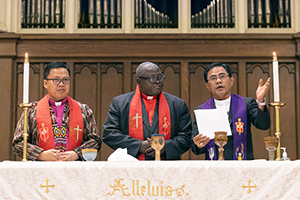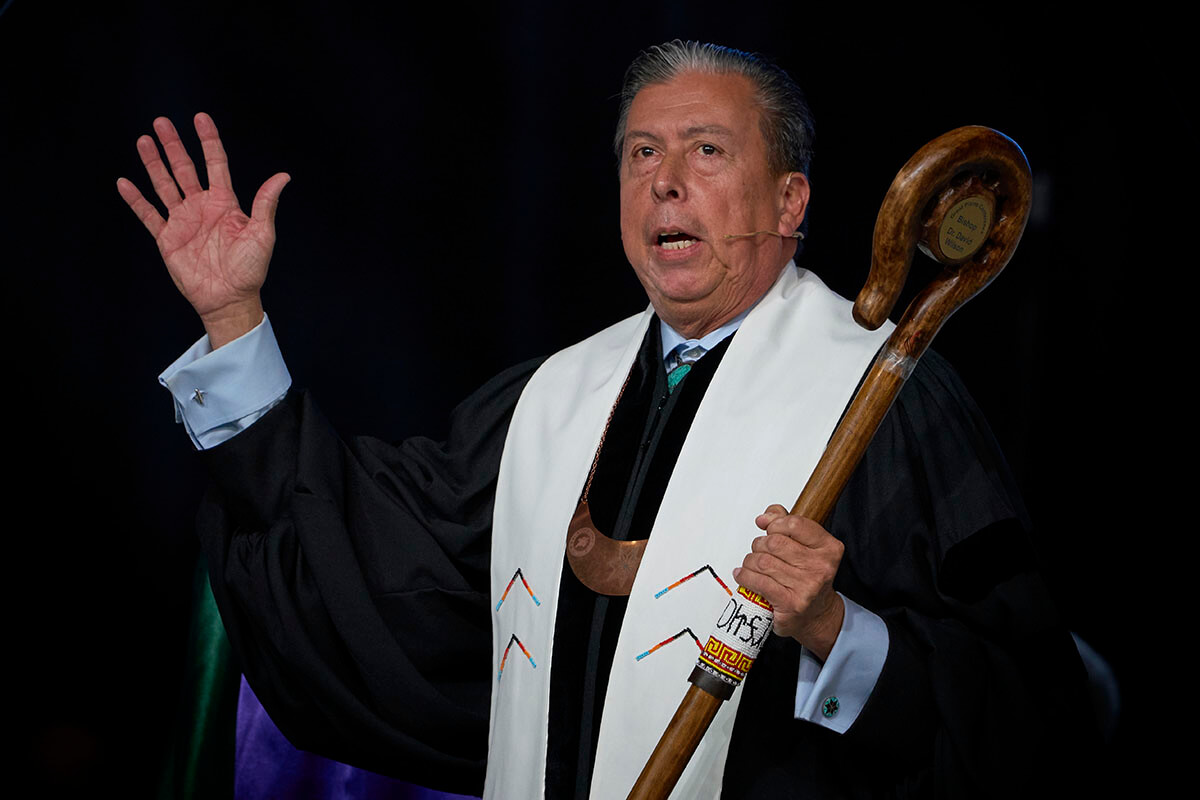Key points:
- Recalling the people who nurtured and encouraged his faith, United Methodism’s first Native American bishop said, “My friends, we have much more in common than not.”
- Wilson, who often shares the way Indigenous cultures look far into the future as they consider decisions, this time closed with a story from the six tribes that make up the Haudenosaunee Confederacy in the northeastern United States.
- “What would that look like,” he asked, “if we made plans, looking ahead seven generations and how these decisions affect all people? Can you imagine how that would impact this denomination and, most importantly, this world?”
Bishop David Wilson, the denomination’s first Native American bishop, encouraged General Conference delegates to consider the people who inspired their faith in the past while considering how decisions today can inspire United Methodists far into the future.
During the morning worship May 1, Wilson, who leads the Great Plains Conference, drew upon Indigenous cultures and his background working at General Conferences of the past.
An ensemble from the Oklahoma Indian Missionary Conference, where Wilson served before his historic episcopal election in November 2022, sang and highlighted a segment of the church often overlooked despite its long history with Methodism.
Subscribe to our
e-newsletter
Many of the Native people relocated to present-day Oklahoma brought the Methodist theology of Christianity with them in the 1840s. The bishop, now serving the Great Plains Conference, showed delegates a design of footprints on his crozier that symbolizes the deadly trek from the southeastern United States to what is now Oklahoma.
Wilson encouraged delegates to remember the constituents they serve.
“We come from four continents, speaking more than 10 languages,” he said. “We come with the commonality of our belief and service to Jesus Christ and the world. And we are also here because we believe in the life and future of this United Methodist Church. My friends, we have much more in common than not.”
Wilson shared Hebrews 13:7-8, CEB: “Remember your leaders who spoke God’s word to you. Imitate their faith as you consider the way their lives turned out. Jesus Christ is the same yesterday, today and forever!”
The bishop, wearing special white moccasins given to him by the Rev. Thomas Roughface, who preceded Wilson as the superintendent of the OIMC, recalled growing up in a Native Methodist congregation in Muskogee, Oklahoma, and how he was nurtured there by adults — including a pastor who recognized God’s call on Wilson’s life.
“I remember those leaders so often, those who first taught me about the Creator God, about faith, love, forgiveness and more,” Wilson said. “Most of all, I remember their witness of how they cared and loved others and modeled and taught me to be proud of my culture.”

Wilson acknowledged the period of disaffiliation that took such a large toll on the denomination. While noting the pain and challenges that resulted in approximately 25% of American congregations leaving The United Methodist Church, Wilson also expressed amazement at the tenacity and faithfulness of laity across the connection who chose to remain, even when their local church decided to leave.
He shared the story of one congregation in Imperial, Nebraska, a town of about 2,000 people in the far southwestern portion of the state. The move to disaffiliate passed by a single vote, leaving about half of the congregation to either give in or move on.
They decided to start something new. The bishop shared a quote from a story told on the Great Plains Conference website.
“We had to make the decision not only to remain United Methodist, with the theology and all the things that went with that, but we had to think about what was important to us. Was the building and the cross and the Bibles and the piano — were those the things that were going to make us stay there? Or was the way we believe and the things we find important, were those the things that were going to make us leave?”

General Conference photos
Wilson visited the congregation on a snowy day last autumn. Four inches of snow fell, but people still flocked to their new congregation.
“The people were happy,” Wilson recalled, “and I could tell they meant what they said earlier: It was their belief in Christ and all that was important to their faith that kept them there as United Methodists.”
The commonalities shared by the people in the new congregation — and their love for all people — led to a recollection of a dinner Wilson had with a group of clergy from Great Plains. He described sitting at the table with Kenyans, Koreans and Anglos. The host, the Rev. Anne Gatobu, who is from Kenya, explained the African Christian perspective of loving neighbors known as “Ubuntu.”
Wilson learned that Ubuntu spotlights the humanness found in being with others. He said when someone pulls away to pursue their own interest, the life-giving force found in the interwovenness of life experiences is lost.
“Because of Ubuntu,” Wilson said, “the message of love in Africa has been preached with great ease and effectiveness as it resonates with the innermost being of people.”
Wilson, who often shares the way Indigenous cultures look far into the future as they consider decisions, closed with a story from the six tribes that make up the Haudenosaunee Confederacy in the northeastern United States.
When major decisions must be made, Wilson said, care and attention go into not only thinking about the ramifications for the present or even a year later. Instead, thought is given to what the results of a decision could be to people living seven generations down the road.
“You heard that correctly: the next seven generations,” Wilson said. “What would that look like if we made plans, looking ahead seven generations and how these decisions affect all people? Can you imagine how that would impact this denomination and, most importantly, this world?”
The service concluded with a time of remembrance of bishops, spouses and delegates who have died since the last General Conference.
Todd Seifert is communications director in the Great Plains Conference.
News media contact: Julie Dwyer at (615) 742-5470 or newsdesk@umnews.org. To read more United Methodist news, subscribe to the free Daily or Weekly Digests.




